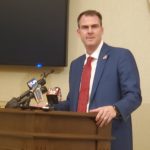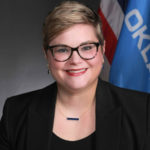Governor Kevin Stitt is working with the Centers for Medicare and Medicaid Services (CMS) to offer a different kind of Medicaid expansion in Oklahoma. He is calling it SoonerCare 2.0. It’ll use the newly introduced federal program called “Healthy Adult Opportunity” (HAO) to receive block grants in order to offer health coverage to the working poor.
 “I have sought Oklahomans’ input over the past several months in crafting my administration’s healthcare plan, and they have told me they want more access to care in rural Oklahoma, they want accountability and better outcomes in the current Medicaid system, and they want us to reclaim our tax dollars from Washington, D.C,” said Stitt. “With SoonerCare 2.0, we will achieve what Oklahomans are asking for, and we will fund it through efficiencies and accountability reforms, protecting Oklahomans from new taxes.”
“I have sought Oklahomans’ input over the past several months in crafting my administration’s healthcare plan, and they have told me they want more access to care in rural Oklahoma, they want accountability and better outcomes in the current Medicaid system, and they want us to reclaim our tax dollars from Washington, D.C,” said Stitt. “With SoonerCare 2.0, we will achieve what Oklahomans are asking for, and we will fund it through efficiencies and accountability reforms, protecting Oklahomans from new taxes.”
Stitt is attracted to the flexibility of the new federal plan presented on Thursday. The state is getting its State Plan Amendment prepared for submission to CMS along with applications to the Healthy Adult Opportunity program. It could bring in an estimated $1.1 billion for health care in Oklahoma.
However, Stitt’s new plan to offer health coverage to the working poor will likely have strings attached for those who participate. A “low cost” premium and worker requirements are being discussed for SoonerCare 2.0. It would only affect the “working poor” population, not those currently covered by Oklahoma’s Medicaid program.
The governor says no new taxes will be needed to fund the new program, but he will need some help from the Legislature and voters. The state’s share of the new program to expand coverage is around $150 million. It’ll involve cost savings, leveraging a current payment program and asking voters to reform the Tobacco Settlement Endowment Trust (TSET).
The SoonerCare 2.0 plan did receive initial support from House Speaker Charles McCall and Senate President Pro Tempore Greg Treat, but they indicated on Thursday they still needed details to fully understand what was being proposed.
McCall said this pathway to expand health coverage is better than what is being offered in State Question 802 which has yet to be set for a ballot this year by Stitt. SQ 802 is the Medicaid Expansion constitutional amendment. The initiative petition gathered more than 300,000 signatures to get the issue to voters.
 “This is a far better plan than putting Obamacare in the Constitution with no flexibility. Our Caucus appreciates Governor Stitt’s strong leadership working with the Trump administration to bring federal dollars back to Oklahoma. We will promptly discuss the governor’s plan as a Caucus and seek input from the entire Legislature upon session convening next week,” said McCall.
“This is a far better plan than putting Obamacare in the Constitution with no flexibility. Our Caucus appreciates Governor Stitt’s strong leadership working with the Trump administration to bring federal dollars back to Oklahoma. We will promptly discuss the governor’s plan as a Caucus and seek input from the entire Legislature upon session convening next week,” said McCall.
House Democrats are not so supportive of Stitt’s proposal. Minority Leader Emily Virgin and House Democratic Caucus Health Care Policy Chair Representative Forrest Bennett released a statement criticizing the governor’s approach.
 “A serious health care plan provides access to health care to all Oklahomans, does so in a way that is equitable to all citizens and is proven to improve health care outcomes. It seems the governor’s plan fails on all three of these points. Under block grants, lawmakers will determine care, not doctors, and unnecessary red tape will limit services amongst the lowest-paid workers in Oklahoma, who also have the highest tax burden. This plan is new and yet to be tested. A straight expansion of Medicaid would invest in services that we know work in other states and in Oklahoma. Finally, a direct expansion has gone through the court process, while the governor’s plan has not. Oklahomans are tired of waiting on their government to do what is right. A straight expansion of Medicaid is the easiest way to increase access to health care in the state, and it has been proven to work in other states.”
“A serious health care plan provides access to health care to all Oklahomans, does so in a way that is equitable to all citizens and is proven to improve health care outcomes. It seems the governor’s plan fails on all three of these points. Under block grants, lawmakers will determine care, not doctors, and unnecessary red tape will limit services amongst the lowest-paid workers in Oklahoma, who also have the highest tax burden. This plan is new and yet to be tested. A straight expansion of Medicaid would invest in services that we know work in other states and in Oklahoma. Finally, a direct expansion has gone through the court process, while the governor’s plan has not. Oklahomans are tired of waiting on their government to do what is right. A straight expansion of Medicaid is the easiest way to increase access to health care in the state, and it has been proven to work in other states.”
Senate Minority Leader Kay Floyd said she is willing to hear any proposal to help get more Oklahomans access to health care.
Stitt is confident his new plan will work for Oklahoma.
“With SoonerCare 2.0, we will pursue comprehensive reform of Medicaid delivery, made possible due to the unprecedented flexibility and innovation being granted by the Trump administration’s Healthy Adult Opportunity initiative. SoonerCare 2.0 will deliver strong personal-responsibility mechanisms for new enrollees, will target dollars on rural healthcare delivery and substance abuse programs, and transform services to be focused on outcomes and health advancements instead of excessive billing practices. In all things, we will pursue Top Ten status, and with SoonerCare 2.0 we will be taking a next step in pulling Oklahoma out of bottom ten healthcare rankings that our State has battled for generations.”


